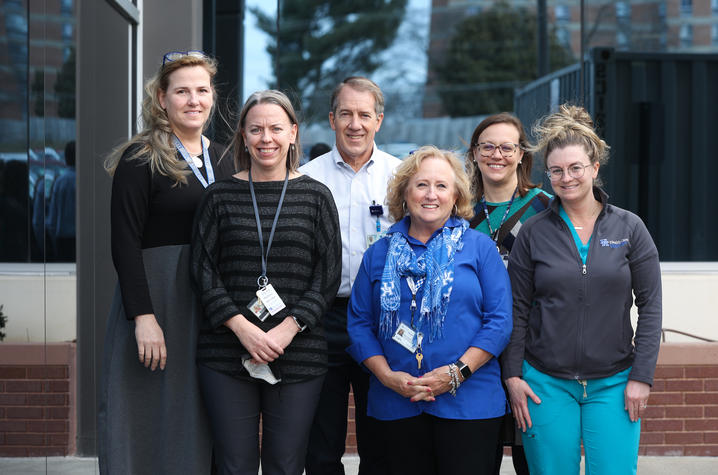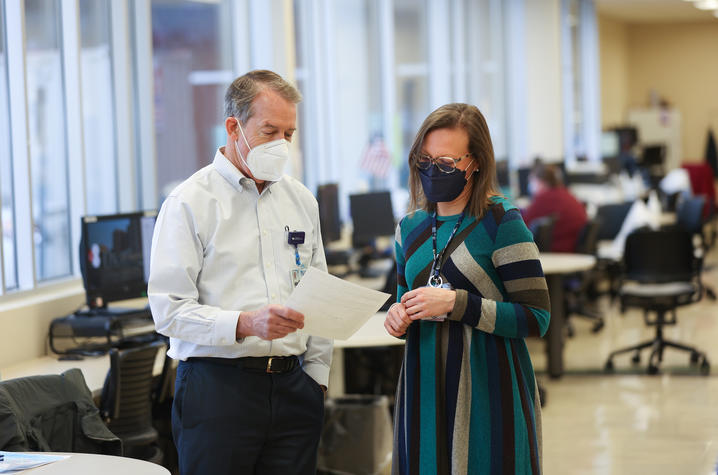'These Children Need Us' - Diabetes Center Helps Young Patients in Hard-to-Reach Communities
LEXINGTON, Ky. (Feb. 22, 2022) — Back in 1982, the late Charlton Mabry, M.D., saw something that still rings true today.
"He realized back in the '80s that newly diagnosed children with Type 1 diabetes were leaving the hospital and then not coming back to the clinic for follow up…then they would eventually end up sick and hospitalized again," said Jackson Smith, M.D., chief of the Division of Pediatric Endocrinology at UK HealthCare.
Mabry's idea to remedy that problem? Take the clinic to the families in Eastern Kentucky.
"These children need us and, the best way to do that for these families is to go see them closer to home," said Smith.
The problem Mabry saw 40 years ago is one Smith and his colleagues are still seeing today. The Barnstable Brown Diabetes Center's traveling pediatric clinics are still going strong with quarterly visits in three different eastern Kentucky communities – Monticello, Barbourville and Pikeville.
"It can be a real burden on families to get here to Lexington, and then their child goes years without having a follow-up," said diabetes educator Angela Hepner.
Going that long without follow-up can create problems. Diabetes management, particularly in children, requires frequent tweaks and changes. The team helps children manage their physical well-being, but also aims to improve their quality of life and help them deal with a chronic illness.
"Their insulin doses, their needs for insulin and blood sugar management are going to change constantly. Also, we can monitor the things children are facing these days, like mental health issues," said Hepner. "If they follow-up regularly, we can catch a lot of things before they become critical. We can set them up on new technology, or we can set them up with mental health counseling or tweak their insulin doses frequently so that they're not dealing with those highs and lows. The more we are involved and the more they work with us as a team, the better the control is overall."
Families traveling from these eastern Kentucky communities would need, at a minimum, four hours of travel time to get to Lexington and back home. And that’s just the time they'd be spending in their vehicle.
At age nine, Misty Lowe's daughter Calissa was diagnosed with Type 1 diabetes – a chronic condition in which the pancreas produces little or no insulin. The diagnosis obviously brought a big change to her life and her family's lives. From learning how to watch and manage her levels, receive insulin, tolerate frequent finger sticks, and make routine visits with doctors – it is a lot for anyone, let alone a child.
"At first, my daughter viewed her condition as being very debilitating. She cried during insulin shots and site changes when she got a pump,” said Misty. “She would ask us, 'Why me?' It was heartbreaking. Don't get me wrong, she was very brave and understood she was different, and things would change, but it was very sad.”
Now at age 12, Calissa does not let her diabetes slow her down at all. She plays basketball and volleyball, shoots archery, is on the academic team, and got the lead in her school play. She is very confident in managing her diabetes, does site changes for her pump independently and changes her glucose monitor without help.
"She is definitely my brave girl and is as normal as her sugar will let her be," said Misty.
A big piece of Calissa's successful diabetes management is the fact that she only has to make a 35-minute drive from her home of Whitesburg to a traveling clinic in Pikeville for her routine checkups. A drive to Lexington would take around three and a half hours, Misty says.
"The clinic by Barnstable Brown helps us tremendously,” said Misty. “It would be much more inconvenient if Calissa's appointments were in Lexington. The clinic helps in that we don't have to take off work the whole day. I am a teacher and I only have to leave a few minutes early instead of trying to get a sub for the whole day.”
The traveling pediatric clinics strive to provide the same experience and care that a patient and their family would receive if they made the long trip to Lexington.
"For decades now, it has been recognized that providing a health care experience that includes not just the provider but also a diabetes educator, dietitians, people versed in the technology of the various medical devices used, is more beneficial for the patient," said Smith.
That is why Barnstable Brown sends a whole team into these communities, where they partner with the local health department to host each clinic.
Letitia Brown's son, Caden, was also diagnosed at nine years old with Type 1 diabetes.
"Little did we know back in 2017 that our Caden Isaac would need a team of doctors to help him survive," said Letitia. “As always, God stayed true to his word and sent us the wonderful staff at UK."
After Caden's diagnosis, the family made a few trips to Lexington, and then they were told about the traveling pediatric clinics – one of them coming to their hometown of Monticello. The convenient location means that Caden can go to school, leave for his appointment, and come right back.
"This has been such a blessing for us… It is the same wonderful staff, but it is much more convenient since the clinic is literally a couple of miles from his school,” Letitia said. "I love the fact that they take the time to do this and take a sincere interest during the visits. They know him individually, they know what he likes to do, they know what he likes to play, and that he likes motorcycles. They talk to him and get on his level, which I very much appreciate because sometimes he doesn't want to listen to me.”
Like Calissa, Caden is now able to live his life to the fullest with his diabetes under control, all while he and his family feel the full support from Barnstable Brown.
"There is a period where you do not really know what you are getting into,” said Letitia. “I am not in the medical field at all, so this is not my forte in the least. It can be information overload and that it is why it is so helpful that they are willing to come to us and spend time with us."
Misty echoes those feelings, noting that the Barnstable Brown providers are “like family.”
"They are so friendly and always eager to help in any way,” Misty said. “I can't say enough about Angela and Deb. They are so easy to talk to and Calissa just loves them both. Angela is always just an email away and replies almost immediately. I never worry about getting a quick answer. She helps with any little thing I have a question with."
Providing support for these families through a high-quality and convenient experience has been made possible since 1982 through the Berea Appalachian Fund, the E.O. Robinson Mountain Fund, and The Barnstable Brown Foundation.
Making sure each patient does not feel alone in their care has always been and will continue to be a hallmark of the services provided through the Barnstable Brown Diabetes Center. As the region's leading provider of diabetes care, the Barnstable Brown Diabetes Center serves as a resource for all providers throughout UK HealthCare and the Commonwealth of Kentucky. Whether it is through referrals, answering questions by phone, or additional education opportunities and programs, the Barnstable Brown team is committed to providing various opportunities for learning and collaboration throughout the year.
In Kentucky and in the U.S., diabetes is one of the leading causes of death and disability. Both Types 1 and 2 diabetes are associated with complications that threaten the quality of life and are the leading cause of adult blindness, end-stage kidney disease, and non-traumatic lower-extremity amputations, The Barnstable Brown Diabetes Center – thanks to years of generous support – improves the lives of those impacted by diabetes.
As the state’s flagship, land-grant institution, the University of Kentucky exists to advance the Commonwealth. We do that by preparing the next generation of leaders — placing students at the heart of everything we do — and transforming the lives of Kentuckians through education, research and creative work, service and health care. We pride ourselves on being a catalyst for breakthroughs and a force for healing, a place where ingenuity unfolds. It's all made possible by our people — visionaries, disruptors and pioneers — who make up 200 academic programs, a $476.5 million research and development enterprise and a world-class medical center, all on one campus.








